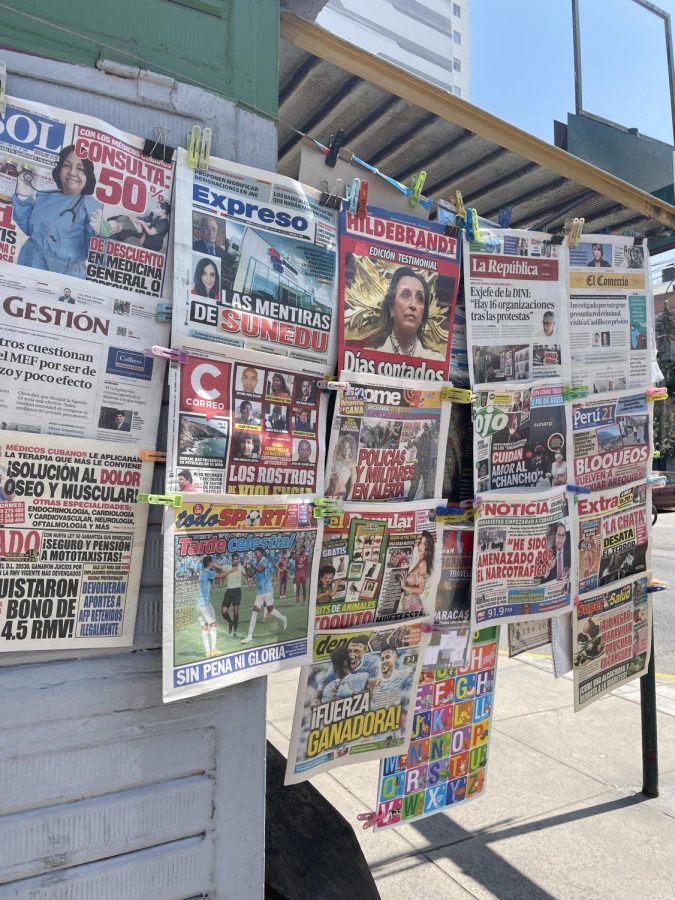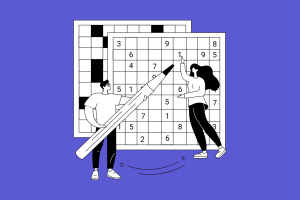Peru Is Destroying Itself
Over winter break, I visited my native country and saw firsthand the ongoing political conflict.
Newsstand depicting different headlines: “Counted days,” “Faces of Violence,” “Police and Military Alerted.”
February 6, 2023
Right now, I have more reasons than ever to both love and hate my homeland.
My family moved from the Peruvian capital of Lima to the United States last February. If you or your family has ever immigrated, then a feeling of duality can resonate with you: the feeling like you’re not fully part of one place or another, and that your identity now transcends continents. Therefore, when I was offered the chance to visit Lima over winter break, I felt excited but nervous.
The Jorge Chavez International Airport of Lima was still as small and yellow as I’d left it. But the air felt tense. While the reason for my visit was positive– a surprise for my grandmother– Lima was enveloped in deadly conflict. Even though Peruvians pride themselves in our history, gastronomy, landscapes and biodiversity, we must recognize our faults. More so now than ever, our divisions are destroying Peru as we know it.
On Dec. 7, 2022 former President Pedro Castillo attempted a self-coup, because of his impending third process of impeachment by Congress for suspected corruption. He tried to dissolve the Congress just as that same institution was voting to take him out of office. However, it was not the first case in Peru. In 1992, former President Alberto Fujimori succeeded in his self-coup by dissolving Congress and assumed full governmental power. Yet, in the present, the Congress did interfere. Castillo was arrested on his way to the Mexican embassy to seek asylum because he was betrayed by the Peruvian road traffic.
On the same day, Vice President Dina Boluarte assumed the presidency and became Peru’s first female president. However, a resolution was far from over; Following Boluarte’s swearing in, general unrest erupted with protests.
The reasons for the population’s uprisings were mixed. People wanted Boluarte to resign, or they were condemning the Congress’s actions. The protests were mostly led by people from Peruvian provinces, which have long been neglected by the centralized government. Yet, the peaceful manifestations turned violent, and the police fought back. The methods of the police are still questioned by the population with some citizens backing them up and others blaming them for more violence. The country was polarized.
The situation has only escalated since. During the protests, I saw a newspaper stand in the district of Pueblo Libre: Countless sensationalist headlines with big, bold, red letters and pictures of Boluarte and Congress, news about Shakira’s breakup, and the right and left pointing fingers at who made things worse. Less apparent was news about those who had been assassinated. The news of a police officer being burned to death was bigger than the murders of more than 50 civilians. In fact, the protesters had died of gunshot wounds in altercations with the police during the marches.
This made me question whether this was a matter of politics or humanity. Especially so, when a series of videos of police officers mistreating protesters circulated through social media. On the internet, people applauded them for standing against terrorists. The national thread of thought was tinted and lost. Who was in the right or wrong in such deadly matters? La Republica, a widely-read, center-left newspaper, mentioned the chaos in the capital and called the situation a “national strike” or “Paro Nacional.”
Naively, I didn’t account for how much these events affected my circle of relatives and friends in Lima. Among my friends, while happy about being reunited, I knew we were experiencing a different reality. When going out with them, I was astounded by the exponential rise of prices: fast-food chain Bembos had tripled in price. My friends simply answered with, “That’s how inflation works.”
More keenly, I became aware of different perspectives within my own family. I asked my aunt, who worked as a journalist for the Peruvian National Police for more than three decades, her opinion. She said, “These people (protesters) are terrorizing our country. They’re burning down buildings and taking over airports. The police are underfunded and do not have the means to defend themselves.”
Whereas, when I asked her son (my cousin), who works as an engineer, he carried a very different view.
“You have to research for yourself and stay away from the big TV channels or news outlets,” he said, “People are very biased.”
If a mother and son can have opposing views on what’s best for our country, it’s understandable how the masses are so divided.
What will come from this? An angry nation won’t cede easily. A fraction of citizens are pushing for a Constitutional Assembly to change or “rewrite” the current Peruvian constitution. The last time our Constitution was redrafted and subsequently enacted was in 1993, because of Fujimori. Yet neither public officials nor citizens are all on board for this Assembly, which only works if the chosen representatives reach an agreement.
The next popular option is to call for re-elections. The current elections are scheduled for 2026. If this were to happen, they’d be brought forward to this year. However, as expected, when the bill was proposed by Boluarte, the Congress disagreed and did not pass it. Discord won’t make the plan work, even the soundest one that pushes for democracy and proper elections.
I left Lima earlier than expected. Even though I’d promised my grandmother we’d have lunch at our favorite place, we couldn’t go since the demonstrations made it too dangerous. Besides, my flight was rescheduled as the threat of the airport’s closure loomed. Airports in Arequipa and Cuzco, other major cities, were also affected. I got my proper goodbye but not a proper exit.
Upon arriving at Jorge Chavez near midnight, police guarded the entrance. An officer ordered my aunt and cousin, who were with me in the cab, to step out. They were denied entrance, only passengers were allowed. The taxi driver wanted to pose as my father so he’d go inside the airport with me. I told him not to worry. I left Lima in pieces, distraught.
Peruvian Nobel Prize of Literature winner Mario Vargas Llosa begins his 1969 novel “Conversation in the Cathedral” by crudely asking: “At what precise moment had Peru fucked itself up?” Decades later now, the question remains. Another question arises, will it ever unfuck itself? If so, when? Whoever you are, whatever side you are on, the situation is deplorable. It must change now, whether by calling elections or reaching a common ground, before more death and destruction consumes the country.



















TAlvin • Feb 8, 2023 at 6:57 am
This began long before Castillo.
Peru presidents:
In just over six years, Peru has had seven different presidents. The period between July 2016 and December 2022.
I am an outsider living in Peru many years. My wife, is AfroPeruvian and my kids Peruvian-Americans. The level of corruption is astounding here in Peru. The Infrastructure is subpar because of corruption. Peru has no industries, wealth is generated by the state, companies set up to contract with the govt and getting paid with tax revenue. Its a vicious cycle, nepotism, croynism , ghost employees, skimming money off of sub par quality contracts, and products and equipment etc. Its like an person consuming itself to feed itself .
The political problem is that congress and the judiciary runs the country and there is not a balance of power, the executive is a figure head. The courts are tainted politically.
Peru is Lima centric which is not representative of the total population.
Outside of Lima the people of the provinces , their needs are forgotten, because the local govt mímics the central govt, corruption, favoritism, Cronyism, nepotism.
I watch relatives struggling to find jobs, though they have University degrees, they are qualified but not connected to the system of favoritism.
Don’t get me wrong I like living her outside of the politics, the beauty and diversity of the people and eco-system (microclimate). The people (outside of Lima) you can’t find a more friendly people. My neighbors are a community. I don’t see that many things will change soon, Its sad that the citizens of a country with so many raw material and natural resources cannot have a living wage and quality of life.